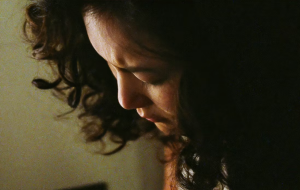Actress Ally Maki has demonstrated her comedy chops on TV’s Hacks, 10 Things I Hate About You, Wrecked, and as the voice of “Giggle McDimples” in the Pixar film Toy Story 4. But lately, her work has taken a dramatic turn – in the serio-comic Apple TV+ show The Big Door Prize, and especially in her new film, Seagrass.
The feature, now playing in theaters in the U.S. and Canada, stars Maki as Judith, a Japanese Canadian woman whose sense of certainty about her life begins to crumble after the death of her mother. A fraying connection to her husband Steve (Luke Roberts), a handsome but emotionally constricted white guy, prompts the couple to head to a resort in British Columbia with their two young daughters – Stephanie (Nyha Breitkreuz) and Emmy (Remy Marthaller). While the kids keep busy with other children on the beach, Judith and Steve participate in group couples’ therapy, an experience that becomes increasingly rocky.
Ally Maki as “Judith” in ‘Seagrass’
Game Theory Films
“I remember I was going to the bank… and I got an email from my agent that was like, ‘Read the script, see what you think,’” Maki recalled during a Q&A after a showing of the film in Los Angeles. “I just opened it in the parking lot… Page one, hooked, and I found myself reading the entire script in the parking lot, then crying… I so closely connected with the character and with the story.”
Maki soon got on a Zoom call with writer-director Meredith Hama-Brown, a Vancouver native who would be making her feature film debut with Seagrass.
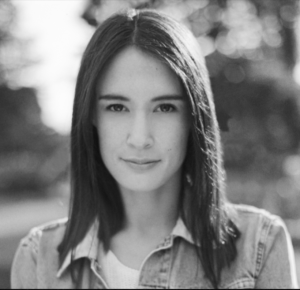
Director Meredith Hama-Brown
Game Theory Films
“We had a very similar shared experience of her being Japanese Canadian, me being Japanese American, both sharing families that had been incarcerated during World War II,” Maki said. “And, so, even though I hadn’t met her yet, I just felt so spiritually, mentally connected with her. And then the character itself, her name was Judith, and that’s my own mother’s name, and I come from a divorced family. So, there were all of these things. It was just bringing up all of these feelings.”
In therapy, Judith and Steve meet another interracial couple – Pat (Chris Pang), who is Chinese Australian, and Carol (Sarah Gadon), his white, self-satisfied wife. As Maki’s character gets to know Pat better, she feels embarrassed that he’s vastly more familiar than she is with the history of racist treatment endured by Japanese Americans and Japanese Canadians.
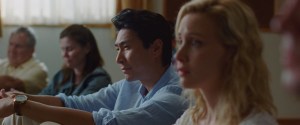
Chris Pang and Sarah Gadon (foreground) in ‘Seagrass’
Game Theory Films
“All of my own experiences of generational trauma from my own family, of coming from a divorced family and just breaking down a character from a Japanese American worldview is something that I’ve not been able to do a lot in my career,” Maki observed. “It’s just a fascinating process of how can you bring the things that have gone unsaid for generations to somebody who’s still holding that inside and how are they holding it inside and how is it coming out in their family and creating trauma for their own children? And you see that in Nyha and Remy’s characters in different ways.”
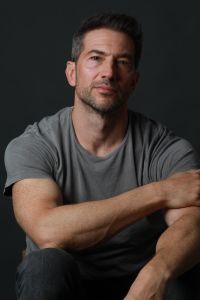
Luke Roberts, “Steve” in ‘Seagrass’
Karina Lidia
The film, set in the 1990s, contains several moments when white characters utter racially insensitive statements, like Carol describing Judith’s interracial children as “exotic,” or a throwaway comment from Steve during a tetherball match with Pat, when he compares his opponent to Jackie Chan. The kids, too, are mocked by white children for their Asian features. The intent of such remarks, conscious or otherwise, is to draw a circle around white people as normative and to other-ise everyone else.
Such cringe-worthy microaggressions might earn condemnation now, but three decades ago, Maki notes, the reality was different. “It does take place in the ’90s. We’ve gotten questions at screenings in the past, why doesn’t Judith say anything? Or why doesn’t anyone take the girls aside and explain it? They didn’t have the language in the ‘90s,” Maki said. As for Steve, her husband in the film, “He’s just thinking, ‘I’m a great guy. How can I be racist? I’m married to you!’”
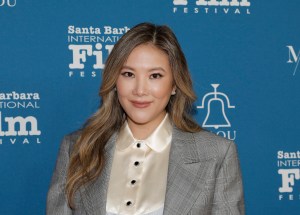
Ally Maki attends the Santa Barbara International Film Festival on February 12, 2024.
Tibrina Hobson/Getty Images for SBIFF
Maki grew up in Washington State, in an overwhelmingly white community.
“I had a few of those exact things happen in my childhood, like almost verbatim, where people are singing the [derisive] song about being Asian and I sing along with them,” she recalled. “You don’t know what else to do, what do you do in that moment? And the girls [Nyha and Remy] too, we had a lot of conversations with them about what this means… It’s definitely [about] having the people on set to be able to chat with them and explain what that means and how they can process that too.”
Seagrass premiered at the 2023 Toronto International Film Festival, where it won the FIPRESCI Prize. It went on to earn prizes from the Vancouver Film Critics Circle, Festival du nouveau cinema in Montreal, and Cinéfest Sudbury in Ontario.
In one scene in the film that takes place in a karaoke bar, Maki gets to display her impressive vocal skill (very early in her entertainment career, she sang in a group called The Valli Girls). The karaoke sequence devolves into a drunken confrontation between Judith and Steve worthy of Who’s Afraid of Virginia Woolf? It’s just one way in which Seagrass allowed the actress to stretch her wings creatively.
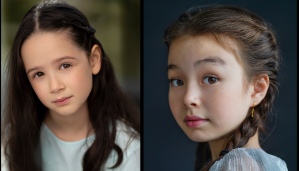
Remy Marthaller (L) and Nyha Breitkreuz
Game Theory Films
Maki recalls almost being surprised by the realization, “I can do drama? I considered myself – I can only do comedy, like I’m here to just say a little one liner because I didn’t even think that I could do [drama] or that it was even viable.”
She adds, “I think that is what agency is all about, is giving the next generation of girls like Nyha, girls like Remy, the opportunity to see themselves as leading characters at that young age, to be able to have characters that look and feel like them, that are not perfect, that are going through things that everyone else goes through.”

